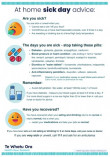Risks associated with taking NSAIDs
Non-steroidal anti-inflammatories drugs (NSAIDs)
Key points about NSAIDs risks
- Most people have no problem taking anti-inflammatories, but some people are seriously harmed by these medicines, especially taking them long-term.
- NSAIDs are often used for pain relief and can generally be safely used, but they may cause harm in some people.
- Learn more about the risks of taking NSAIDs.

Examples of commonly used NSAIDs include ibuprofen (Ibugesic®, I-Profen®, Nurofen®), diclofenac (Voltaren®), naproxen (Noflam®, Naprosyn®), celecoxib (Celebrex®) and mefenamic acid (Ponstan®). See which NSAIDs are available in New Zealand.
Before you use these medicines, weigh the risks and other side effects carefully – check with your pharmacist or doctor if they are suitable for you.
NSAIDs sometimes cause the lining of the stomach to bleed. This is because the chemicals (prostaglandins) that are reduced by anti-inflammatories are also involved in helping to protect the lining of the stomach from the effects of the acid within the stomach.
Stomach problems can occur in anybody taking NSAIDs, but you are more likely to have them if you:
- have had stomach ulcers before
- are 60 years or older
- drink 3 or more alcoholic drinks a day
- smoke
- take warfarin, steroids (prednisone), SSRIs (citalopram, fluoxetine, paroxetine, sertraline) or more than one NSAID such as an NSAID plus low-dose aspirin
- take NSAIDs regularly
- take higher doses of NSAIDs.
Ulcers and stomach bleeding can happen without any warning symptoms.
Studies have shown that all NSAIDs, except aspirin in low doses, can increase the chance of heart attack or stroke.
- The risk may be greater if you have heart disease or you have risk factors for heart disease such as smoking, high blood pressure, high cholesterol, diabetes. However, the risk may also be increased in people who do not have heart disease or those risk factors.
- Heart problems caused by NSAIDs can happen within the first weeks of use and may happen more often with higher doses or with long-term use.
- NSAIDs should not be used right before or after heart bypass surgery.
All NSAIDs, including selective COX-2 inhibitors, can reduce blood flow to the kidneys and affect the way your kidneys work. You're more likely to have kidney problems with NSAIDs if you:
- are dehydrated
- are 60 years or older
- already have problems with your kidneys
- are taking other medicines that also affect your kidneys such as ACE inhibitors ARBs, or diuretics.
Examples of ACE inhibitors are captopril, cilazapril, enalapril, lisinopril, perindopril and quinapril.
Examples of ARB blockers are candesartan and losartan.
Examples of diuretics are furosemide, bumetanide, bendroflumethiazide, chlortalidone, indapamide and metolazone.
Taking NSAIDs together with ACE inhibitors or ARBs and diuretics is called the triple whammy. Read more about the harmful effects of the triple whammy(external link).
NSAIDs can raise blood pressure in some people. Some people with high blood pressure (hypertension) may have to stop taking NSAIDs, if they notice that their blood pressure increases even if they are taking their blood pressure medications and following their diet. If you are taking blood pressure medication, talk to your healthcare provider before taking NSAIDs.
NSAIDs may increase the risk of miscarriage if used in early pregnancy (trimester 1 and 2). It is recommended to avoid the use of NSAIDs during early pregnancy unless the benefit justifies the risk.
Don't use NSAIDs at all during the third trimester because they may affect the large blood vessels and cause serious kidney problems in the unborn baby. NSAIDs can cause delay in labour and lead to problems during birth such as excessive bleeding.
The following link provides further information about ibuprofen. Be aware that websites from other countries may have information that differs from New Zealand recommendations.
Anti-inflammatory painkillers(external link) Patient info, UK
Brochures
At home sick day advice(external link) Health New Zealand | Te Whatu Ora, 2023
Medicines and side effects(external link) Healthify He Puna Waiora, NZ, 2024
5 questions to ask about your medications(external link) Health Quality and Safety Commission, NZ, 2019 English(external link), te reo Māori(external link)
Brochures

At home sick day advice
Health New Zealand | Te Whatu Ora, 2023

Medicines and side effects
Healthify He Puna Waiora, NZ, 2024

Health Quality and Safety Commission, NZ, 2019 English, te reo Māori
Credits: Healthify He Puna Waiora Pharmacists. Healthify is brought to you by Health Navigator Charitable Trust.
Page last updated:





